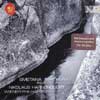Smetana Má Vlast
A fascinating, often revealing performance that ultimately lacks the rustic bite and ardour of its most idiomatic rivals
View record and artist detailsRecord and Artist Details
Composer or Director: Bedřich Smetana
Genre:
Orchestral
Label: Red Seal
Magazine Review Date: 13/2003
Media Format: CD or Download
Media Runtime: 84
Mastering:
Stereo
DDD
Catalogue Number: 82876 54331-2

Tracks:
| Composition | Artist Credit |
|---|---|
| Má vlast |
Bedřich Smetana, Composer
Bedřich Smetana, Composer Nikolaus Harnoncourt, Conductor Vienna Philharmonic Orchestra |
Author: Rob Cowan
The first things that struck me about Nikolaus Harnoncourt’s Má vlast were its leisurely gait and mellow demeanour. Then, as ‘Vy?ehrad’ started to build, the way the brass, the lower brass especially, dominate the sound canvas. The proud procession towards the movement’s collapse (from around 9'35") cuts a handsome profile, trumpets and cymbals to the fore.
The flutes at ‘Vltava’s’ source are truly piano, the violin melody that surges in their train beautifully shaped. For the ‘hunt in the woods’ the trumpets and trombones are more prominent than the horns, and the ‘peasants’ wedding’ is a fairly low-key affair. Perhaps the high point of Harnoncourt’s river jaunt is the moonlit ‘Dance of the Nymphs’, violins and violas dolcissimo as marked with skilfully negotiated contrasts in emphasis between the flowing clarinet and flute lines. Balancing is less than ideal in the ‘St John Rapids’: the brass virtually obliterates the strings, though the Vienna Philharmonic’s tonal swell is impressive.
At the start of ‘Sarka’ Harnoncourt favours an expressive legato, less ‘con fuoco’ than expected. He’s rather lighter than the norm in the dance episode that follows and unexpectedly dramatic at the start of the duet between Sarka (solo clarinet) and the hero Ctirad (here a solo cello). The love music itself is gentle but fairly static, the ribald banquet scene gaining spirit as it proceeds. I liked the way the lower strings punctuate the shuddering climb towards the coda, but the coda itself seems oddly earthbound, with tepid trombones and under-projected woodwinds.
‘From Bohemia’s Woods and Fields’ opens with impressive solemnity, while the clarinet Dumka that follows evokes infinite sadness, especially as Harnoncourt subtly lightens the mood for the succeeding Bohemian song. Thereafter, fugue, ‘German’ song (the big central melody) and polka all seem to me a little on the heavy side. ‘Tabor’ opens imposingly, the brass choirs properly weighted, though I felt some of the rests a mite excessive. The battle music is nicely articulated but lacks drama; likewise ‘Blaník’, which although sensitive to the textural complexion of individual episodes seems lacklustre, so that the great clinching denouement, where key themes combine, fails to make its proper impact.
It’s odd how Harnoncourt’s descriptive booklet note seems to trace the course of one work and his rather sullen live performance suggests something quite different: I came away feeling that I had – and hadn’t – listened to Má vlast. I learnt many things from this performance, but I left it more perplexed than moved. Kubelík in Munich, Berglund in Dresden and Talich in Prague soon put me back on course, far more bracing and celebratory. Theirs are the versions I would go to first. But I will keep Harnoncourt by me in the hope that his very singular manner in this glorious perennial suddenly adds up to a coherent whole. I have to admit that at the moment, it doesn’t.
The flutes at ‘Vltava’s’ source are truly piano, the violin melody that surges in their train beautifully shaped. For the ‘hunt in the woods’ the trumpets and trombones are more prominent than the horns, and the ‘peasants’ wedding’ is a fairly low-key affair. Perhaps the high point of Harnoncourt’s river jaunt is the moonlit ‘Dance of the Nymphs’, violins and violas dolcissimo as marked with skilfully negotiated contrasts in emphasis between the flowing clarinet and flute lines. Balancing is less than ideal in the ‘St John Rapids’: the brass virtually obliterates the strings, though the Vienna Philharmonic’s tonal swell is impressive.
At the start of ‘
‘From Bohemia’s Woods and Fields’ opens with impressive solemnity, while the clarinet Dumka that follows evokes infinite sadness, especially as Harnoncourt subtly lightens the mood for the succeeding Bohemian song. Thereafter, fugue, ‘German’ song (the big central melody) and polka all seem to me a little on the heavy side. ‘Tabor’ opens imposingly, the brass choirs properly weighted, though I felt some of the rests a mite excessive. The battle music is nicely articulated but lacks drama; likewise ‘Blaník’, which although sensitive to the textural complexion of individual episodes seems lacklustre, so that the great clinching denouement, where key themes combine, fails to make its proper impact.
It’s odd how Harnoncourt’s descriptive booklet note seems to trace the course of one work and his rather sullen live performance suggests something quite different: I came away feeling that I had – and hadn’t – listened to Má vlast. I learnt many things from this performance, but I left it more perplexed than moved. Kubelík in Munich, Berglund in Dresden and Talich in Prague soon put me back on course, far more bracing and celebratory. Theirs are the versions I would go to first. But I will keep Harnoncourt by me in the hope that his very singular manner in this glorious perennial suddenly adds up to a coherent whole. I have to admit that at the moment, it doesn’t.
Discover the world's largest classical music catalogue with Presto Music.

Gramophone Digital Club
- Digital Edition
- Digital Archive
- Reviews Database
- Full website access
From £8.75 / month
Subscribe
Gramophone Full Club
- Print Edition
- Digital Edition
- Digital Archive
- Reviews Database
- Full website access
From £11.00 / month
Subscribe
If you are a library, university or other organisation that would be interested in an institutional subscription to Gramophone please click here for further information.




